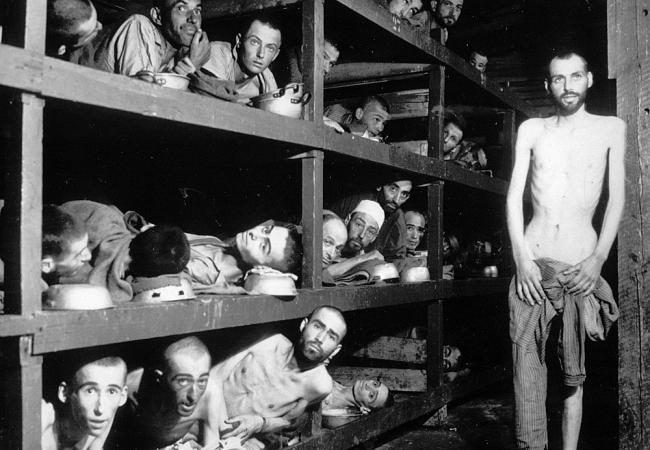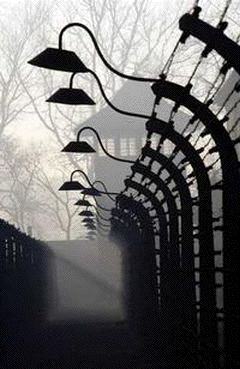
I had no idea that a class could benefit me or affect my decisions; however, Facing History and Ourselves has challenged and changed both me as a person and the decisions I make. I have seen how the use of seemingly innocent propaganda can be deadly, learned that I cannot judge another person’s decision, and realized how harmful being a bystander can be. This class has taught me about myself, about one of the greatest tragedies in history and about how important it is to never forget the memory of those who were murdered.
The use of propaganda really stood out to me. Through seemingly innocent posters and other types of media, Hitler was able to influence public opinion on Jews and other “enemies” of the party, all while demoralizing the “enemies” themselves. It was an extremely effective way of reaching people because it was subtle and understood by people of all types and ages. Posters were an especially popular form of propaganda; they portrayed Jews as being lazy, corrupt and inferior people, especially compared to the strong and golden Germans displayed. These posters helped reinforce the ideas of the Jews being inferior and the Germans being a superior master race. It is amazing to think that Hitler was able to so strongly influence intelligent people through the use of something so simple.

Facing History showed me how no one should judge another person’s decisions in their own situation. It is so easy to say what one might do in a given situation, but being in that decision and having to act in a split second is very different and far more difficult. The Jewish people were called vermin and bacteria, were ripped apart from their friends, families, and homes and were treated in extremely humane ways. In the concentration camps, it must have been so easy to forget that they were educated and intelligent individuals; instead, it was easier to become an instinctive animal, obtaining food or clothing in any way possible and thinking for yourself alone. But some strong and brave people managed to cling to what they knew was right and be hopeful. These people did not allow the Germans to crush their spirits; they resisted. In the Grey Zone, some of them even organized armed resistance. Even those who were not considered a direct threat to the Germans were treated poorly. Civilians who lived in invaded countries lived in fear of the Germans and the power they carried. This made me respect the people who made choices they believed to be morally right even more. It is easy to say you believe in doing one thing; it is quite a different thing to do it when it could jeopardize something, such as your life, or the lives of your loved ones, might be in danger. It is important to remember this before we judge other peoples’ decisions.

Facing History also taught me how important it is to not be a bystander. Being a bystander can be just as bad as being the perpetrator, especially if you believe what is happening is wrong. That means you are allowing something you supposedly think is wrong to happen, without even trying to do anything about it. Hitler did not singlehandedly murder millions of innocent people; he did have the idea, but he also had to have thousands of people help him. These people were not just his advisors and the S.S., they were the ones who allowed the Holocaust to happen, without trying to prevent it. It is shocking and absolutely horrific to think of how many people were murdered in cold blood; it is also terrible to think about how it could have been so easily prevented. The German people were so crushed, so desperate to be respected and to push the shame of World War I onto a scapegoat that they allowed Hitler to poison their minds. They became bystanders, thus allowing one of the most heinous events in history to take place. Often, people were bystanders because of intimidation or fear for themselves, but it is hard to imagine why the church did not get involved. In the movie Amen, the Catholic priest and the S.S. officer desperately tried to get the help of the Catholic church in order to stop the terrible death camps and expose the great evils of the Nazis. But no one believed them, or was willing to risk their own comfort to find out or help. The priest and the officer were pleading with the church officials, people who are supposed to be representatives of God and Christian beliefs and yet they did nothing. The church and its followers are supposed uphold Christian morals, which including caring for those in need, no matter who they are. It was so frustrating to watch the officials being presented with such condemning evidence, and yet they did nothing. All this goes to show that it is crucial for us to act upon what we know to be right, and not allow other people to be victims. The situation might not be as obvious as a death camp, it might be something as small as another student being bullied. However, you can still make a huge difference in another person’s life by standing up for what you believe in and helping another human being. It is important to remember this and do the right thing.
So often, the movies we watched would cause me to cringe or look away. It was so hard to watch the films that brought some of the pain of the Holocaust back to life. The pain I felt cannot even compare to the magnitude of the pain. Cruel, cruel things were done to completely innocent people. Families were torn apart, children were tortured in inhumane medical experiments, helpless people were punished in brutal ways. Taking this class opened my eyes to how easily something so tragic and awful can happen, because of one person’s poisonous ideas. I realize how crucial it is to never forget those who were murdered. We must keep their memory alive and never allow the Holocaust to be repeated. We must never forget that behind all statistics, there were individuals: smart, talented, and innocent people who deserved to grow, learn, laugh, live, and grow old, but were instead murdered. It is absolutely crucial to remember who you are and to be firm in your identity and what you believe in: it is the only way to prevent such a tragedy from happening again.




